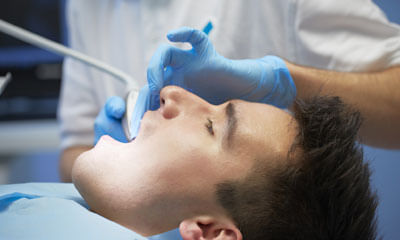Endoscopy For Stomach
Hello doctor my age is 29 and in my endoscopy report seen mild antral gastritis what does that mean? ...
Ask Free Question
That means you have inflammation of your gastric mucosa in the antral region of your stomach. There are many causes of gastritis but most commonly it is associated with poor diet and lifestyle. For treatment you should follow the doctor's advice to avoid complications like ulcer.
I have continued pain in upper middle abdomen. i done ultrasound & abt test. I take medicine but not relief. ...
Ask Free Question
Please do a endoscopy first if this does not helps in diagnosis a mri will be required to be done take easily digestable food only pan dsr od to continue for now.
I'm 16 years old, and i'm having pain in my upper abdomen after eating anything for a month. The pain has gotten worse s ...
Ask Free Question
Hi, you predominantly have gerd. Pain may be due to overlapping symptoms of dyspepsia (epigastric pain syndrome) or gerd related. Anxiety can precipitate or worsen the symptoms of gerd. If you have taken ppi (pantoprazole, omeprazole etc.) for some time regularly and have no symptom relief or if you have difficulty in swallowing, vomiting, blood in vomit, weight loss. Then you will benefit from consulting a gastroenterologist. May need to undergo, endoscopy +/- oesophageal manometry.
Respected sir/madam sir my dad has been suffering from colon cancer for 5 years! he is 49 years old! 6 chemotherapy comp ...
Ask Free Question
The thick mucosal folds in the stomach as noted in the endoscopy report could indicate inflammation or a reaction to chemotherapy. It's important for your father to continue his follow-up with me so that I can provide a detailed interpretation and guide further treatment.
Sir I am suffering from hepatitis b which diagnosed 1 year earlier then after scanning it shown hepatitis b liver cirrho ...
Ask Free Question
Hi, from the details provided by you, I understand that you have cirrhosis of liver with chronic hepatitis b infection as the cause. You do not seem to have developed complications of portal hypertension viz. Gi bleed (blood in vomitus or stools), ascites (collection of fluid/water in stomach) or hepatic encephalopathy (drowsiness, transient loss of consciousness) etc. You need to continue with anti-viral medications for hepatitis b and cardivas along with regular screening and follow up with blood tests (every 3 to 6 months), ultrasound of abdomen (every 6 months) and surveillance endoscopies. Liver transplant is usually needed once you start developing complications or liver cancer (hcc) and is decided by your gastroenterologist/ hepatologist based on several parameters and scores (meld score.)
Hello i'm b mukherjee. Age 29 yrs. I've esophagus motility disorder. I felt severe pain and burning sensation left side ...
Ask Free Question
I understand the complexity of your symptoms associated with esophagus motility disorder and functional heartburn. It's crucial to approach your condition comprehensively, considering your desire for pregnancy, here are few things to consider: medication management: esomeprazole 40 mg / esogress is a proton pump inhibitor (ppi) used to manage acid reflux. Its efficacy can vary among individuals. It's vital to adhere to the prescribed dosage and discuss any recurring symptoms with your healthcare provider. Lifestyle modifications: implement lifestyle changes to minimize acid reflux triggers. This includes avoiding large meals, acidic or spicy foods, and lying down after eating. Elevating the head of your bed can assist in reducing nighttime reflux. Dietary adjustments: collaborate with a dietitian to identify specific trigger foods and customize your diet accordingly. This can significantly impact the frequency and intensity of acid reflux and associated symptoms. Continuous monitoring: maintain a detailed symptom diary to track patterns, triggers, and medication effectiveness. Regularly share this information with your healthcare provider for informed decision-making. Pregnancy planning: it's commendable that you're considering pregnancy. Discuss your plans with your obs/gynaec doctor to explore acid reflux management strategies that are safe during pregnancy. They may recommend alternative medications or lifestyle modifications. Nasal and throat symptoms: mucus accumulation in the throat and nose can be associated with acid reflux. Ensuring proper acid suppression is crucial. Additionally, consider nasal saline irrigation to alleviate nasal congestion and mucus buildup. Ear, nose, and throat (ent) assessment: given the pressure and symptoms in your throat, nose, and ear, consider consulting an ent specialist for a comprehensive evaluation. They can assess for any structural or inflammatory issues contributing to your symptoms. Alternative medications or therapies: if esomeprazole alone is insufficient, your healthcare provider may explore alternative medications or therapies. This could include combining medications or trying different acid-suppressing drugs. Remember, managing acid reflux is a nuanced process, and individual responses to treatments vary. Regular follow-ups with your healthcare provider are essential to assess progress and adjust your treatment plan accordingly. If you have specific concerns or require further tailored advice, feel free to initiate a private consultation. Your well-being is paramount, and i'm here to support you on your health journey.
I am suffering from upper middle stomach pain I did barium swallow and it's good. Is barium swallow and barium meal same ...
Ask Free Question
A barium swallow primarily focuses on visualizing the esophagus, assessing its structure and function. On the other hand, a barium meal, or upper gastrointestinal (gi) series, is a more comprehensive examination that involves imaging the entire upper digestive system, including the stomach and small intestine. Since you've undergone a barium swallow, which specifically looks at the esophagus, and the results were good, it suggests that there are no apparent issues in that area. However, if your upper middle stomach pain persists, your healthcare provider may consider a barium meal to explore the broader upper digestive system. In addition to barium meal, your healthcare provider may recommend other diagnostic tests, such as imaging studies, blood work or endoscopy, to gather a more complete understanding of the potential causes of your pain. If you feel comfortable, consider sharing more details about the nature of your pain, any associated symptoms, and the timeline of when it started. This information can assist in tailoring the most effective and personalized approach to managing your symptoms.
If I take little quantity of food or liquid, my stomach will expand like balloon as well return into the mouth from stom ...
Ask Free Question
Go for upper abdominal endoscopy and usg. There are symptoms of gerd, h- pylori infection. Treatment will be based on investigation.
Hello doctor, i'm having pain in lower left abdomen pain from 7 to 8 months, I have done many sonographies but except fi ...
Ask Free Question
It is most likely a case of peptic ulcer. Upper gi endoscopy and later colonoscopy is recommended. You can also go for a cect abdomen if renal function is fine. Contact for consultation. I shall guide you.
I am getting more saliva in mouth and I am chewing food so much time due to this saliva small meal also I am eating for ...
Ask Free Question
Unfortunately, I cannot diagnose medical conditions or recommend specific treatments. This information requires consultation with a qualified healthcare professional. However, I can offer some general information and suggestions that might help you understand your situation better and consider the next steps: possible causes of excessive saliva and difficulty swallowing: gastroesophageal reflux disease (gerd): this condition can cause stomach acid to back up into the esophagus, triggering excessive saliva production and difficulty swallowing. Dental issues: certain dental problems, like misaligned teeth or dentures that don't fit properly, can affect chewing and swallowing, leading to increased saliva and longer meal times. Neurological conditions: some neurological conditions like parkinson's disease or stroke can affect the muscles involved in swallowing, causing difficulty and slowness in the process. Anxiety or stress: these factors can also manifest physically, impacting saliva production and digestion. Tips for managing increased saliva and difficulty swallowing: maintain good oral hygiene: brush and floss regularly to ensure good mouth health and minimize irritation that might trigger excess saliva. Eat smaller, more frequent meals: this can help reduce the amount of food in your stomach at once, potentially making swallowing easier. Chew your food thoroughly: slower and more thorough chewing allows better food breakdown and mixing with saliva, facilitating easier swallowing. Maintain good posture: sitting upright while eating can improve swallowing mechanics. Consider stress management techniques: if anxiety or stress are influencing your symptoms, practicing relaxation techniques like deep breathing or meditation might be helpful. Recommendations: consult a doctor or gastroenterologist: they can conduct a thorough examination and recommend further tests, like endoscopy, to identify the underlying cause of your symptoms and provide appropriate treatment. Consult a dentist: if dental issues are suspected, a dentist can assess your oral health and suggest solutions to improve chewing and swallowing functionality. Seek mental health support: if anxiety or stress appear to be contributing factors, consider seeking professional help from a therapist or counselor. Remember, seeking professional medical advice is crucial for understanding the cause of your increased saliva and swallowing difficulties and receiving proper treatment. Don't hesitate to schedule consultations with relevant healthcare professionals to address your concerns and improve your well-being. I hope this information is helpful and encourages you to prioritize your health by seeking professional assistance.






